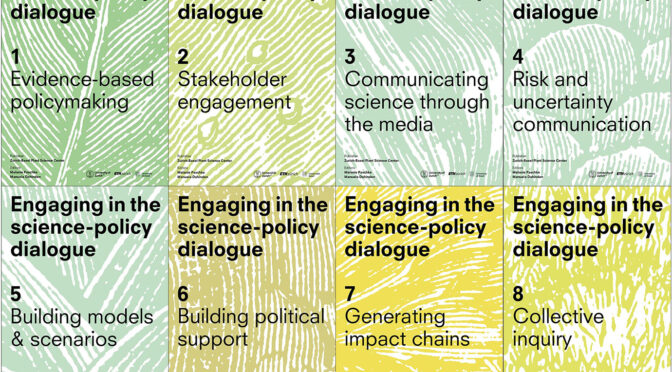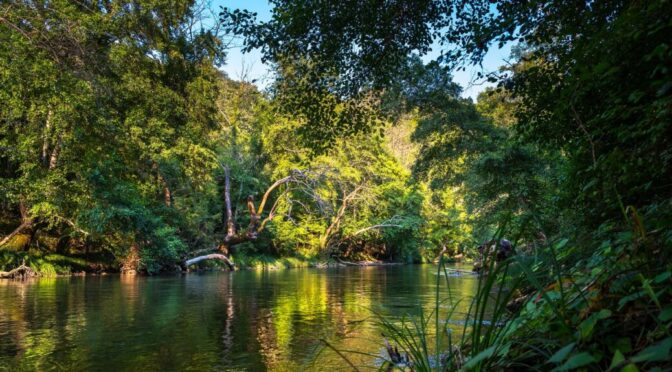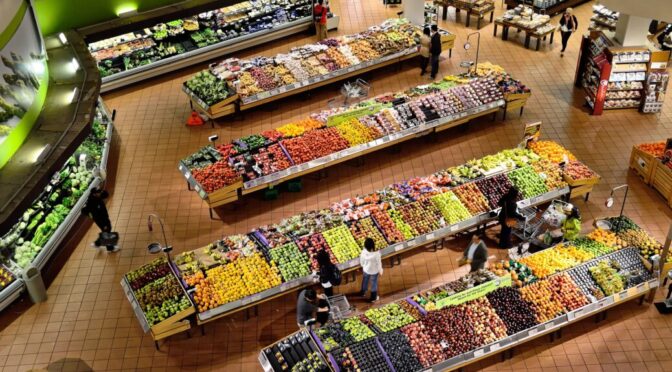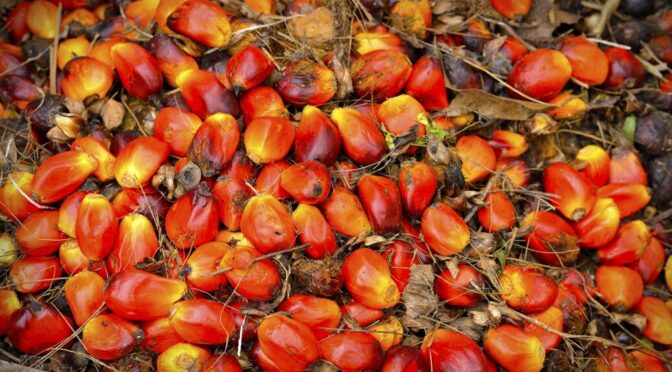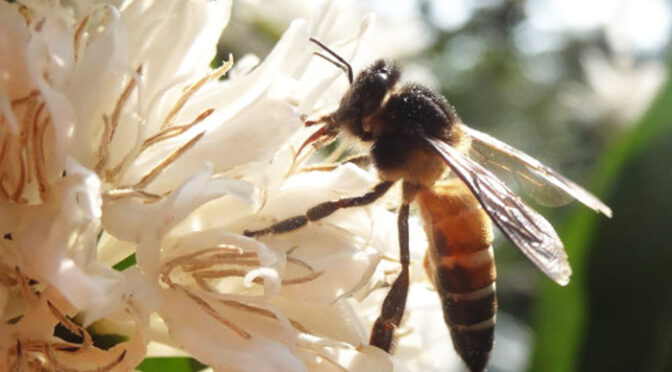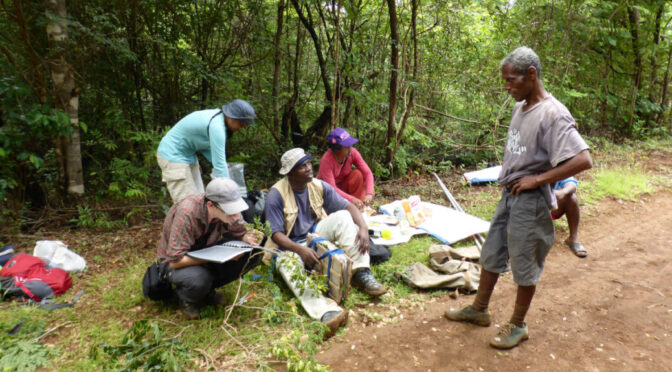These workbooks aexplore the role of scientists in the science-policy dialogue. They are addressed to students in our PhD program and to other interested readers. The workbooks offer close insight into theory, processes, and tools for evidence-based policymaking.
Continue reading Workbooks: engaging in the science-policy dialogueHow tree diversity improves forest productivity
By Yuanyuan Huang
Experimental studies in grasslands have shown that the loss of species has negative consequences for ecosystem functioning. Is the same true for forests? Huang et al. (2018) report the first results from a large biodiversity experiment in a subtropical forest in China. The study combines many replicates, realistic tree densities, and large plot sizes with a wide range of species richness levels. After 8 years of the experiment, the findings suggest strong positive effects of tree diversity on forest productivity and carbon accumulation. Thus, changing from monocultures to more mixed forests could benefit both restoration of biodiversity and mitigation of climate change.
Yuanyuan Huang is now an alumni of the PSC Science and Policy program and from University of Zurich. She received a fellowship from the European Union’s Seventh FrameworkProgramme, IDP BRIDGES, PITN-GA-2013-608422 to carry out her doctoral thesis. In a recent Nature paper she and her colleagues showed their scientific results on how tree diversity improves forest productivity.
Reference
Huang, Yuanyuan et al (2018).
Impacts of species richness on productivity in a large-scale subtropical forest experiment
Science 05 Oct 2018:
Vol. 362, Issue 6410, pp. 80-83
DOI: 10.1126/science.aat6405

Alumni PSC Science & Policy
Rewriting Our Food Supply
Devang Mehta summarized in his short opinion report some of the current discussion how genome editing could revolutionize agriculture. Starting out with the technology at hand and outlining the importance of natural variation and creating diversity, Devang Mehta shows what a new agriculture using genome editing could look like and puts things in a global perspective while referring to the pressing legal questions regarding patenting, ownership and funding that are addressed in the current public, political and expert debate. The opinion report is addressed to the lay public.
Continue reading Rewriting Our Food SupplyMaintaining biodiversity and managing oil palm expansion
What can policy papers and scenarios achieve?
By John Garcia-Ulloa
Oil palm extension remains an important environmental topic given the large negative impacts it can have on tropical biodiversity.
John Garcia-Ulloa had developed models and scenarios to understand biodiversity change in oil-palm landscapes under REDD+ initiatives during his science-policy fellowship from PSC and Mercator Foundation Switzerland.
In 2014 a close collaboration between ETH Zurich and IUCN was established to convene stakeholders from the oil palm sector and develop a strategy for IUCN to address the impacts of oil palm expansion on biodiversity. The main activity within the fellow’s internship at the policy Partner was to convene a group of experts to develop guidelines for the protection of biodiversity on oil-palm landscapes for IUCN.
Co-production of pollination services in coffee plantations
Developing sustainable management scenarios
By Charlotte Pavageau
What was the main impact for policy?
Pavageau et al in close cooperation between ETH Zurich and the
Ashoka Trust for Research in Ecology and the Environment (ATREE), India searched the links between pollination service, coffee production and land use in coffee plantations in India.
Land-use allocation has multiple and complex economic and environmental implications. Thus designing optimal land-use is a key challenge for decision-makers and policies aiming at promoting sustainable development for a given region. The results of this study contributed to inform land-use and agricultural policies on the consequences of different collective decision-making scenarios on coffee productivity, economic gain and biodiversity conservation, by using landscape-scale ecosystem services models. This is important for better planning of land-use policy.
Continue reading Co-production of pollination services in coffee plantationsMolecular identification methods for carrying out origin analysis for illegally logged and transported Malagasy rosewood
By Sonja Hassold
What was the main impact for policy?
Madagascar is a biodiversity hotspot and its forests harbor a vast diversity of precious woods. For decades, ever increasing demand for timber on the international market and its high commercial value have led to massive illegal exploitation of rosewood, palisander and ebony species in Madagascar. Controlling the international trade of illegally logged timber is challenging. One reason is that logs and sawn wood are difficult to assign to species or geographic origin (provenance).
Continue reading Molecular identification methods for carrying out origin analysis for illegally logged and transported Malagasy rosewoodWhat`s next after the ECJ judgement on gene editing?
“We need a societal discourse in which the political and ethical dimensions of the research in question are explored. What sort of agricultural system do we want? How are the new technologies to be used?” emphazised Prof. Matthias Mahlmann, lawyer and member of the Swiss Ethics Commission for Non-Human Biotechnology, at a recent panel discussion on genome editing at the www.tnam2019.ethz.ch.
The participants of the TNAM 2019 conference take a tri-national view on the main issues and potential consequences of the ruling of the European Court of Justice (ECJ) on organisms obtained by mutagenesis. The PSC has summarized the discussions at: https://www.plantsciences.uzh.ch/en/outreach/roundtable.html
Continue reading What`s next after the ECJ judgement on gene editing?ENGAGE with Society: Noch 8 Tage bis Bewerbungsschluss

Noch acht Tage können Fragen und Anliegen an unsere Forschenden formuliert werden! Das neue partizipative Forschungsformat gibt Forschenden des PSC und Partnern aus der Öffentlichkeit und Praxis die Möglichkeit, für Fragestellungen und Herausforderungen einer nachhaltigen, ökologischen und ressourcenschonenden Landwirtschaft eines alternativen und regional-orientierten Ernährungssystems Forschungswissen zu generieren und dieses gemeinschaftlich für die Praxis zu übersetzen.
Continue reading ENGAGE with Society: Noch 8 Tage bis BewerbungsschlussEPSO statement on the Court of Justice of the EU ruling regarding mutagenesis and the GMO Directive

EPSO publishes its statement to the ruling of the European Court of Justice (ECJ) on organisms obtained by mutagenesis (case C-528/16) stating that the ruling disregards scientific evidence. (re-post Feb 19, 2019 | EPSO, WG Agricultural Technologies)
Genome editing is not the only answer to current challenges of agriculture and society, but it represents an important tool for harnessing plant science knowledge toward a future-ready agriculture, for allowing Europe to play a leading role in innovative plant science, and to contribute to the bioeconomy by boosting the performance of underutilised plant species and biological resources. In the drive to achieve sustainable development goals, no useful tool should be neglected. EPSO supports a science-based change to the present European legislation and proposes to establish a legislation adapted to future technological developments by increasing emphasis on product-based risk assessment. Meanwhile, further tangible commitment is needed to support, inform and communicate about innovative plant science and its societal role.
Gemeinsame Planung von Forschung: ENGAGE with Society
Nachhaltigkeitsinitiativen, Landwirte und pflanzenwissenschaftliche Forschung engagieren sich gemeinsam für ökologische Landwirtschaft und alternative Ernährungssysteme.
Bewerbungsschluss für die Formulierung der Anliegen am 20. April 2019 und Teilnahme an der gemeinsamen Ideenwerkstatt am 10. Mai 2019, 13:00 – 17:00.
Worum geht’s?
Wir laden Sie ein, Ihre Fragen und Anliegen an die Forschenden des Zurich-Basel Plant Science Center (Universitäten Zürich und Basel, ETH Zürich) in den Themenbereichen ökologische Landwirtschaft und alternative Ernährungssysteme zu formulieren.
Wir möchten mit Ihnen zusammen eine evidenzbasierte, naturwissenschaftliche Lösung oder Ergebnisse zu Ihrer Fragestellung erarbeiten. Zusammen definieren wir die wissenschaftliche Fragestellung und den Forschungsprozess und stossen gemeinsam Transformationsprozesse an – damit wir etwas bewirken für Nachhaltigkeit und Ihre Initiative.
Continue reading Gemeinsame Planung von Forschung: ENGAGE with Society
